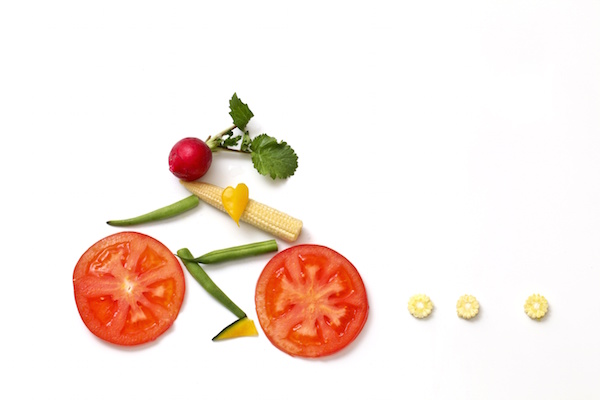
TUESDAY, Aug. 31 (HealthDay News) — Eating a wide variety of fruits and vegetables may help protect some smokers from lung cancer, a new European study suggests.
But, the researchers stressed that quitting smoking will do far more to reduce risk than “an apple a day” or having a salad for lunch.
In the study, participants who ate a diet that contained a diverse mix of fruits and vegetables appeared to have a 27 percent lowered risk of a common type of lung cancer, the researchers reported.
“First and foremost, the best way to reduce one’s risk of lung cancer is to quit smoking. That is of paramount importance,” said principal investigator Dr. H. Bas Bueno-de-Mesquita, project director of cancer epidemiology at the National Institute for Public Health and the Environment in the Netherlands. “However, we realize that there are still millions worldwide who cannot and don’t want to quit smoking. To just ignore them would be somewhat of a pity. This study shows there is a possibility of reducing one’s risk even if one is a smoker.”
Keep in mind that “wide variety” meant more than a banana with breakfast and a helping of peas and carrots with dinner. Think kale and spinach; berries and melons; cabbage, cauliflower and eggplant — some 40 different fruits and vegetables in all.
The researchers analyzed data on more than 450,000 adults from 10 European countries. Participants filled out questionnaires about dietary habits and lifestyle, including occupation, medical history, tobacco and alcohol use and physical activity.
Over the course of nine years, 1,613 of the people were diagnosed with lung cancer.
Vegetable consumption was divided into eight categories: leafy vegetables; fruiting vegetables; root vegetables; cabbages; mushrooms; grain and pod vegetables; onion and garlic; and stalk vegetables. Vegetables did not include legumes, potatoes and other tubers.
The 14 fruits tracked included fresh, dried and canned fruits but excluded nuts, seeds and olives.
Participants were then divided into four groups, or quartiles, based on the diversity of their diet. Those in the highest quartile ate between 23 and 40 different types of fruits and vegetables during the prior two weeks. Those in the lowest quartile ate less than 10 different types of fruits and vegetables.
Smokers who ate the greatest variety of fruits and veggies were 27 percent less likely to get squamous cell lung cancer, which accounts for about 25 percent to 30 percent of all lung cancers, than smokers who ate the least variety.
“It is important to realize the risk reduction one can achieve by eating a greater variety of fruits and vegetables will be minor in relation to quitting smoking,” Bueno-de-Mesquita stressed.
The study is published in the September issue of Cancer Epidemiology, Biomarkers & Prevention. It should be noted that the study relied on “self reports” — in which the participants described to the researchers their fruit and vegetable consumption. Such studies, while valuable, are not considered the “gold standard” of research — a double-blind, placebo-controlled study.
But what is it about fruits and vegetables that may ward off the changes in cells that cause tumors to grow?
There probably isn’t one “magic” compound in the fruits and vegetables, Bueno-de-Mesquita said, but instead many compounds that interact with each other and the body in ways that aren’t yet understood.
It can be dangerous to put too much stock in any one substance, he added. A study in Finland found smokers who took the antioxidant beta carotene and vitamin E supplements actually had an increased risk of lung cancer.
Previous research has also linked fruits and vegetables with lowered risk of cancer. A 2007 World Cancer Research Fund/American Institute for Cancer Research report concluded that fruits probably protect against lung cancer, but there was no evidence that vegetables did.
But other research has suggested eating a variety of vegetables can reduce the risk of other types of cancers, including colorectal, gastric, breast, oral and pharyngeal cancer and squamous cell esophageal cancer.
Marjorie McCullough, strategic director of nutritional epidemiology at the American Cancer Society, said fruits and vegetables may help to protect against lung cancer, but every smoker should be working on quitting.
“Quitting smoking is far and away the most important way to lower the risk of lung cancer, but eating a variety of fruits and vegetables may further help lower the risk of several cancers,” McCullough said.
Eating lots of fruits and vegetables can also help prevent obesity, which is a risk factor for certain cancers, she added.
More information
The U.S. National Cancer Institute has more on lung cancer.

